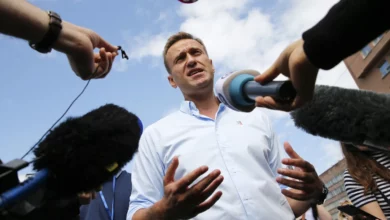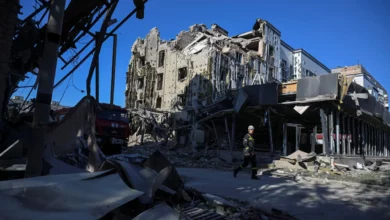Russia believes Libyan leader Muammar Qadhafi should give up his rule and is prepared to help broker his departure, a senior Russian official said on Friday.
The offer – a change in tone from the Kremlin's previous criticism of Western intervention in Libya – will provide a boost to NATO powers who say they are determined to finish the job they started and end Qadhafi's 41-year rule.
NATO said it was preparing to deploy attack helicopters over Libya for the first time to add to the pressure on Qadhafi's forces on the ground.
But his security forces demonstrated they are far from a spent force, launching rocket attacks overnight in the rebel-held town of Zintan and fighting rebels on the outskirts of the city of Misrata.
The Russian mediation offer was announced on the sidelines of the Group of Eight summit in Deauville, France, where Russian President Dmitry Medvedev is among the heads of state in attendance.
"Colonel Qadhafi has deprived himself of legitimacy with his actions, we should help him leave," Russian Deputy Foreign Minister Sergei Ryabkov said in Deauville.
He said Russia could take on a mediation role with the aim of transmitting "certain signals" to the sides in the conflict.
Earlier, US President Barack Obama said he had agreed with French counterpart Nicolas Sarkozy that the only acceptable outcome was for Qadhafi to go.
"We agreed that we have made progress on our Libya campaign but that meeting the UN mandate of civilian protection cannot be accomplished when Qadhafi remains in Libya, directing his forces in acts of aggression against the Libyan people," Obama told a news briefing at the G8 summit.
"We are joined in resolve to finish the job," he said.
A NATO coalition led by France and Britain has been bombing Libya since March, under a UN mandate to protect civilians caught up in a battle with rebel forces intent on ending Qadhafi's 41-year rule.
But the rebels' advance toward Tripoli has been checked, creating a quandary for Western powers who want a quick outcome in Libya but do not want to risk getting embroiled in another Middle Eastern conflict by putting troops on the ground.
Britain and France have tried to help break the deadlock by agreeing to deploying attack helicopters over Libya. This will be able to give close ground support to rebel forces, though they are also at greater risk of being shot down.
The commander of NATO's operation for Libya said British and French helicopters would be deployed soon.
"These helicopters will be operated under the Unified Protector mandate… they will be brought into action as soon as they are ready," Lieutenant General Charles Bouchard told a briefing.
Qadhafi has denied attacking civilians, saying his forces were forced to act against armed criminal gangs and Al-Qaeda militants. He says the NATO intervention in an act of colonial aggression aimed at grabbing Libya's oil.
Rebel-held Misrata, Libya's third-biggest city, is where the helicopters are likely to deploy first.
Rebels fighting there say they are needed because pro-Qadhafi forces are able to evade attack from high-altitude warplanes by concealing artillery pieces under trees or moving them once they have fired, a tactic known as "shoot and scoot."
A Reuters reporter in Misrata said rebels and forces loyal to Libyan Qadhafi engaged in a second day of fierce fighting on the Western outskirts of the city on Friday.
The reporter said he could see white puffs of smoke and dust from where mortars fired by pro-Gaddafi forces were landing.
The rebels responded by firing back with rockets and heavy machine guns, shouting "Allahu Akbar!," or "God is Greatest!," after each volley.
Doctors at Misrata's hospital said three rebels were killed and 16 wounded in the fighting on Friday.
"We are being attacked from all sides with rockets, RPGs (rocket-propelled grenades) and mortars," said Faraj al-Mistiri, 36, a rebel fighter.
"It started between 5:30 and 6:00 am. They have advanced. It's normal to and fro. They are trying their hardest to get back into Misrata," he said.
Qadhafi's forces intensified their attacks too on the town of Zintan, part of a chain of mountain-top settlements in the Western Mountains, near Libya's border with Tunisia, where rebels have been holding off attacks for months.
A foreign doctor in Zintan, about 150 km southwest of Tripoli, said the town came under intense rocket fire overnight from pro-Qadhafi forces positioned to the east.
"There must have been about a hundred (strikes). I wasn't counting, but there were four or five rockets every half an hour or 15 minutes," Anja Wolz of Doctors Without Borders said by telephone.
Wolz said it was a "miracle" no one had been seriously hurt. She said Zintan's hospital was relocating to Jadu, another rebel-held town about 18 km (11 miles) west of Zintan.
"Zintan is emptying, people are leaving," she said.
A spokeswoman for Doctors Without Borders said the organization was in the process of evacuating its team from Zintan because of the bombing, but that it hoped to return.
In the capital Tripoli, Qadhafi's main power base since he lost control over the eastern side of the country to the rebels, NATO launched a fourth night of airstrikes on Thursday.
Several large explosions rocked Tripoli late on Thursday night and a column of smoke was seen rising from Qadhafi's Bab al-Aziziyah compound, a Reuters correspondent said.
Earlier, Libyan Prime Minister al-Baghdadi Ali Al-Mahmoudi gave a rare news conference at which he repeated offers of a ceasefire. Rebels have rejected previous truce offers because they say Gaddafi's departure is a pre-condition.
"Libya is serious about a ceasefire," Mahmoudi said.
But he added: "The leader Muammar Qadhafi is the leader of the Libyan people; he decides what the Libyan people think. He is in the hearts of the Libyan people."




